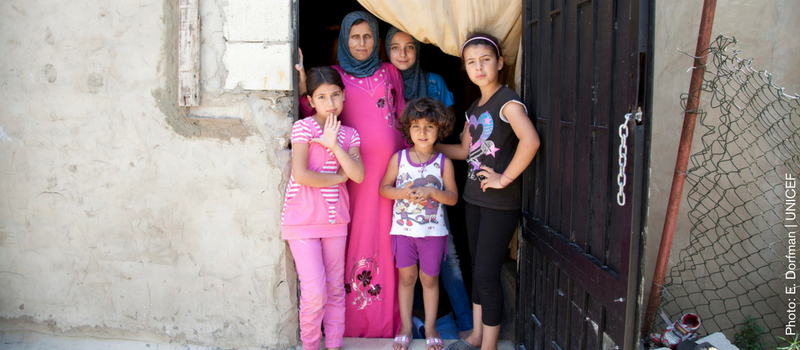Budgets are moral documents and the President’s budget request released this week is a moral and practical failure for displaced women, children, and youth around the world.
As the White House delivered President Trump’s Fiscal Year 2018 budget request to Congress this week, Ambassador Nikki Haley – who is on her first international trip as U.S. Ambassador to the United Nations – visited the Za’atari camp in Jordan to see how refugees there are coping. Clearly moved by the bleak setting, Haley told reporters “We're the number one donor here through this crisis. That's not going to stop. We're not going to stop funding this.” Referencing a convoy of trucks carrying food aid, Haley said “This is all in the name of our Syrian brothers and sisters… We want you to feel like the U.S. is behind you.”
I’ll never forget the first time that I visited Za’atari. It was 2012 and while the camp was newly formed then, it already hosted more than 30,000 refugees from nearby Syria. Today it is home to more than 80,000 residents. In this remote location, inside tall chain link fences, thousands of temporary shelters fill the landscape – an improbable home for people who have experienced unimaginable terror.
While Za’atari offers Syrian refugees a haven from the barrage of barrel bombs dropped on their homeland, it was not a safe refuge, particularly for women and children, when I first visited the camp. At that time, the camp failed to meet international humanitarian standards. For example, showers lacked doors and roofs, denying women, many of whom have fled from Syria because of sexual violence, any privacy, dignity, or security. The refugees I met that day had survived Syria and now were surviving Za’atari.
The fact is that this story is not unique to Za’atari, nor to Jordan, nor even the Middle East. Refugees in camps and other displaced settings globally are struggling to find work and create a livelihood for themselves and their families, and to stay safe. Too many refugees are surviving on insufficient humanitarian aid. For most, it will be decades before they are able to return home. For some, that day will never come.
While Ambassador Haley toured Za’atari, speaking with compassion and support, the White House unveiled a budget that sent a very different message to refugees around the world.
The president’s budget would slash funding for humanitarian assistance – including more than half a billion-dollars in cuts to migration and refugee assistance (MRA). The Women’s Refugee Commission and other organizations estimate that $3.6 billion is needed for MRA to ensure continued assistance to conflict affected-areas and to advance protections for survivors of gender-based violence. The president’s budget proposes just $2.7 billion for MRA.
These cuts would be devastating to women refugees and their families by denying them access to basic services and protection, making an already dismal situation even worse. At the Women’s Refugee Commission, we know what happens when refugee women are not provided with sufficient support to help them carve paths toward self-reliance – they will do whatever is required to support their families. This means turning to increasingly dangerous options, like working illegally, engaging in transactional sex, and even making perilous journeys to other countries in the hope of leading a more normal existence elsewhere.
For those of us who have seen refugee camps like Za’atari with our own eyes and spoken with the residents, we know that it is unconscionable to make such drastic reductions in humanitarian aid at the very time it is most needed. And yet, that’s exactly what this budget does. It plays politics with the lives of displaced people fleeing the conflict in the Middle East, crises in Africa, and violence in Central America. It puts many more women and girls at risk.
Instead of pulling the rug out from under refugees, we must work to ensure access to the tools and resources they need to rebuild their lives, their families, and communities. No one wants this more than the refugees themselves. We look to Congress to provide bipartisan leadership, reject this budget, and stand firmly with refugees.


